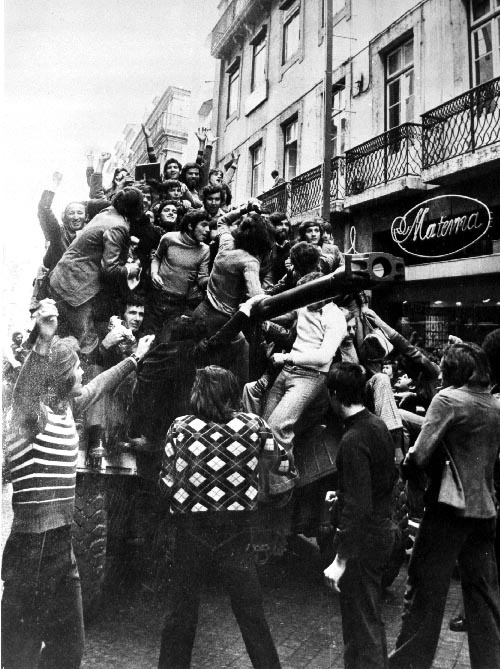The Carnation Revolution as seen from Switzerland
«It took just fifteen hours for a regime that was about to reach its half-century of existence to collapse without a shot being fired», summarised Switzerland’s Ambassador to Lisbon, Jean-Louis Pahud, in his report to Bern (dodis.ch/39053). On 25 April 1974, a group of soldiers opposed to the continuation of the colonial wars and the dictatorship peacefully brought down the Salazar regime. In a Europe at the height of the Cold War, the events in Portugal were scrutinised everywhere.
Military officers against the Empire and for democracy
At the time of the military coup by the Armed Forces Movement (MFA), the Portuguese Empire, the Estado Novo, was at war on three fronts in its African colonies: Angola, Mozambique and Cape Verde and Guinea-Bissau. The colonial wars had been going on for a decade and seemed unwinnable in the eyes of the Portuguese officers leading them. Tired of the dictatorship’s stubbornness in maintaining an Empire in Africa, a small group of officers organised to demand an end to colonisation, the democratisation of the regime and economic measures to benefit the metropolitan population.
On Thursday 25 April, MFA soldiers took to the streets of Lisbon to take control of strategic locations in the city. They were quickly followed by a large civilian crowd demonstrating peacefully. The Estado Novo collapsed in a matter of hours. In the crowd, a waitress at a Lisbon restaurant decided to adorn the soldiers’ rifles with red carnations, unknowingly naming the revolution in progress.
Bilateral relations with the Estado Novo
From Switzerland’s point of view, Portugal was an ally at the time. The two countries were founding members of the Economic Free Trade Association (EFTA) (dodis.ch/15944) and enjoyed good economic relations. Switzerland mainly imported wine from Portugal and exported watches to the Iberian country (dodis.ch/36773). Meanwhile, in the 1970s, Portugal gradually became a country where seasonal workers were recruited (dodis.ch/36575).
However, the issues of human rights and colonial wars somewhat darken the overall picture. While Switzerland refused to associate itself with the Council of Europe’s criticism of Portugal (dodis.ch/35631), it did not completely ignore the criticism of Portuguese colonialism by Asian and African countries at the UN (dodis.ch/34107). Pressure increased from year to year to denounce the crimes committed during the colonial wars (dodis.ch/35680), to the point where in 1971 the FDFA said that «a Portuguese invitation [for the Swiss ambassador in Lisbon] to visit Mozambique should be refused» (dodis.ch/40016).
Military coup or revolution?
For Bern, the most worrying question following this putsch was whether it was a question of a reorganisation at the head of the State between factions or whether the MFA risked losing control of events and Portugal being swept up in a revolution. Fears that Marxist organisations would seize power were rife throughout the constitutional process, although the Communist Party took part in the legalist project along with the other components of the movement (dodis.ch/39055).
But alongside the political crisis, Portugal was also in the throes of a major economic crisis from the end of the year 1974 onwards (dodis.ch/39059). Faced with the risk of revolution, Western countries prepared economic aid measures, through the EEC and EFTA, which the Swiss administration decided not to support at first, under pressure from the Vorort, which was concerned about the treatment of Swiss companies in Portugal (dodis.ch/39060). Ultimately, in September 1976, the Swiss parliament approved the country’s participation in the Industrial Development Fund set up by EFTA (dodis.ch/48596).
Attitude towards former colonies
In the summer of 1974, the Minister of Foreign Affairs of the Portuguese transitional government announced to the Ambassadors of the Western countries in Lisbon that he was determined to liquidate the Empire, but that he «considered [the] non-recognition of Guinea-Bissau by the Governments in question as a gesture of courtesy and consideration towards Lisbon and expressed his warm thanks». Portugal thus intended to maintain control of the decolonisation process (dodis.ch/38885). However, in the space of sixteen months, the three Portuguese colonies gained independence and were rapidly recognised by Switzerland.
This e-dossier on the Carnation Revolution takes place in the wake of the seminar organised by the Portuguese Embassy in Berne and Dodis on 21 November 2023 (dodis.ch/W30629) and the publication of two books on Switzerland’s bilateral relations with Portugal and its former colonies:
-
Reto Monico, Regards suisses sur la révolution des œillets: les rapports secrets de l’Ambassade à Lisbonne (1974–1976), Lisbonne ; Genève, 2023.
-
Sabina Widmer, Switzerland and Sub-Saharan Africa in the Cold War, 1967–1979, Leiden; Boston, 2021.
